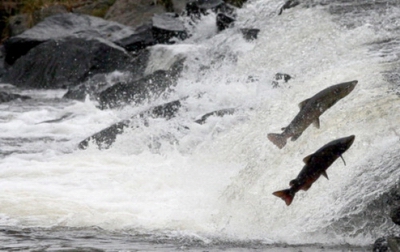
A delegation from the Scottish Government visited Norway last month for talks with ministers and firms working in Scotland with the aim of increasing salmon exports, including to Scotland’s priority Far East market.
It comes with a slump in Norway’s domestic salmon exports to China in recent years. Norwegian fish farmers claim the fall is due to a Chinese boycott of their imports after the Nobel Peace Prize was awarded to Chinese dissident Liu Xiaobo in October 2010.
Reports in the Norwegian press stated that the delegation, led by Enterprise Minister Paul Wheelhouse, was aimed at ensuring Scotland ends up “taking over Norway’s position as the leading exporter of fresh salmon to China”.
Such a deal would help Norway’s economy too, with an estimated 65 per cent of Scotland’s production of farmed salmon being owned by Norwegian businesses.
Ministers and enterprise chiefs in Scotland believe exports of salmon could be a massive new earner for the Scottish economy, and are now pushing hard into the Chinese market with the aim of increasing further Scotland’s £500 million sales there.
But there are now warnings that Scotland could be seen to be exploiting a human rights issue to boost its own income.
Mark Bevan, programme director for Amnesty International in Scotland, said last night: “Whilst we welcome a boost to the Scottish economy, we do have to question whether there is a limit to the values we are willing to trade away. Are unlawful detentions, flagrant misuse of the death penalty, and consistent restriction on freedom of expression worth the price?”
The row comes after the Scottish Government’s growing ties with China were challenged last year when First Minister Alex Salmond opted not to meet the Dalai Lama during a visit to Scotland.
It emerged afterwards that Salmond had assured the Chinese consul-general in Edinburgh that his government was “not involved” in the visit.
In contrast, both David Cameron and Nick Clegg hosted Tibet’s spiritual leader, prompting warnings from Chinese sources that trade repercussions could follow.
Wheelhouse said the salmon deal with Norway “makes sense” and said his visit will boost the Scottish sector’s development and help to ensure further sustainable growth in salmon farming.
“With Scottish salmon being globally recognised as a premium product and in high demand from the best hotels, retailers and restaurants around the world, we must continue to look at ways of sustainably growing the sector,” he said.
A spokesman for the Scottish Salmon Producers’ Organisation said: “The Scottish salmon farming industry is part of a global industry with around 66 per cent of the production owned by Norwegian companies. Scottish salmon is exported to more than 60 countries and those markets, including China, buy our salmon because of its quality, safety and provenance. There has been a highly successful marketing push by all Scottish seafood in Asian markets recently which has helped achieve growth in sales.”







